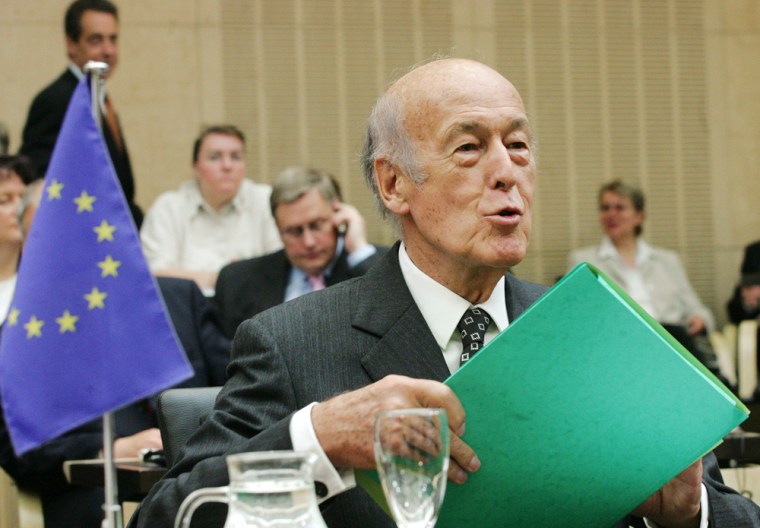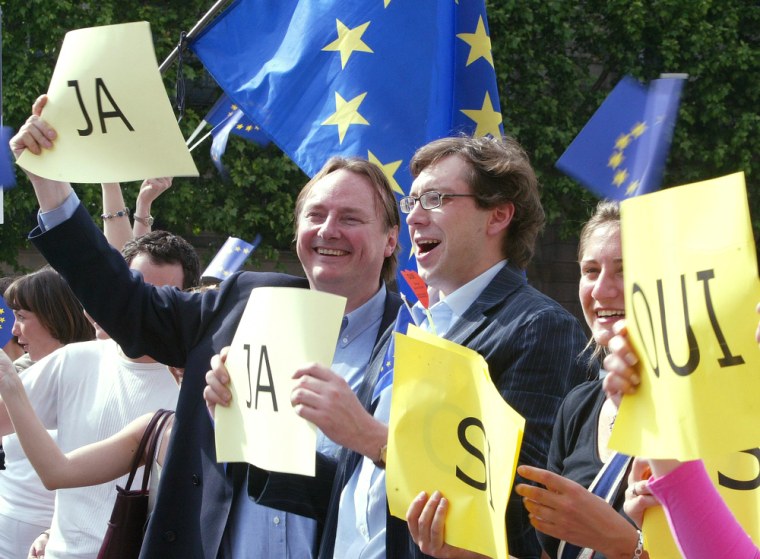After saying "oui" to greater European unity over the past 50 years, the French may be ready to say "non" on Sunday, slamming the brakes on further political and economic integration.
Led by France and Germany, Europe has spent more than half a century constructing a unified, peaceful continent out of the ruins of World War II. The original group of six nations has expanded and evolved into a European Union of 450 million people in 25 countries, 12 of which use a common currency.
For many Europeans, the EU has become an essential bulwark against U.S. dominance on the world stage.
But, according to opinion polls, the French electorate is fed up and likely to oppose the new European constitution in Sunday’s referendum.
The document was designed to lay out the union’s values, streamline decision making, pave the way for more integration and a common defense policy, and to bolster foreign policy.
“The argument for it is that it would help Europe become more of a world power,” said Daniel Keohane, senior research fellow for security and defense policy at the Center for European Reform.
“It would do for foreign policy what the Maastricht treaty did for the euro (currency),” he said.
But, all member states must ratify the constitution by October 2006 — two years after it was signed — for it to become law.
And it faces a bumpy road ahead, with the French fearing Anglo-Saxon ultra-liberal values, and the Dutch and British wary of the exact opposite — a centralized, over-regulated Gallic state. Throw in a mass of loosely-related internal politics and external fears and the stage is set for a 25-way showdown.
All eyes on France
Germany's parliament completed ratification of the charter on Friday, but many member states have agreed to seek the approval of their citizens through referendums. All eyes are on France as it sets out to vote on Sunday, followed by the Dutch on Wednesday.

While French President Jacques Chirac and his government support the treaty, nearly a dozen successive polls have put the ‘no’ camp in the lead.
Bookstores and libraries are filled with information on the constitution and the debate resounds in Parisian cafes and bistros, but analysts say all the talk has little to do with the actual treaty.
“In France, I don’t think I’ve heard of arguments against it that are about the constitution,” said Robin Niblett, Director of the Europe Program at the Center for Strategic and International Studies.
Internal politics will play as much, if not more, of a role in the vote than the actual subject matter, he said, noting that one of the main reasons to vote ‘no’ would be because “you don’t like Chirac and want to give him a bloody nose.”
Considering Chirac’s current unpopularity, a lot of ‘no’ votes could accrue right there.
“I think the chance there’ll be a ‘no’ vote is at least 75 percent,” said Marcel van Herpen, director of the Cicero Foundation, which describes itself as an independent pro-EU and pro-Atlantic think tank.
Many see the 457-page constitution as inaccessible to the general population, and a reflection of the divide between Europe's politicians and the working classes.
With less than 1 percent of the population having read the whole treaty, according to van Herpen, votes will be cast to reflect approval or disapproval of the union in general.
'Families are divided over it'
“It’s a real point of debate in France … even families are divided over it between parents and children,” he said, speaking by telephone from Paris.
Polls have shown that the majority of people under 25 and those over 55 support the constitution, but that 25-55 year-olds are predominantly against it.
“Young people are more positive, having exchanges with other countries. … Older people have memories of the world war and want to protect against it happening again,” van Herpen said.
“But, people of the working generation are afraid for their work – there’s a lot of talk of people losing their jobs, Poles coming in hordes, Turks waiting at the frontiers to come in,” he said.
Concerns about economic migrants pouring into France and factories moving into Central and Eastern Europe to take advantage of lower labor costs are fueled by a general malaise over France’s declining economy and decade-long-spell of 10 percent unemployment.
In addition to fears of an open market, opponents of the constitution argue that “France is just one voice amid 25 instead of an important founding member,” said Niblett, of CSIS.
“They say ‘we’re in favor of Europe but not in favor of this Europe’ — the argument can be used either way, this Europe that’s against (EU applicant) Turkey, or the one against capitalism,” Niblett said.
'The treaty is dead'
Analysts, columnists, and political pundits are all guessing at what will happen if France fails to ratify the constitution. Meantime, a predicted ‘no’ vote in the Netherlands looms just days away, and a doubtful question mark hangs over a future U.K. poll.
In the past, second referendums have been held in Ireland and Denmark to get key treaties passed, but a French ‘no’ could throw Europe into turmoil, or at least a prolonged deadlock.
“Other countries who called another referendum have done it because they changed one key issue,” said Keohane.
“You can’t change the question (of the constitution) so easily, and if they can’t have a second referendum, they can’t ratify it, so the treaty is dead,” he said.
If the Netherlands fails to ratify the treaty — which is likely given the country’s political disarray and rise of xenophobia following the assassinations of right-wing politician Pim Fortuyn and film maker Theo van Gogh — it could hold another referendum or the Parliament could overrule the current one, according to some analysts. But, a French failure could stop the entire process.
“Not only is France important as a founding member and a big country, but because it’s involved in every policy area – it has been the driving force behind the policies of the passport free travel area and the euro,” Keohane said.
“It’s a bit Orwellian – all member states are equal, but some member states are more equal than others,” he said.
London’s The Times reported Thursday that unnamed ministers told the newspaper that Britain is prepared to forego its promised referendum if the French or Dutch cast ‘no’ votes. And if put to the test, voters in the United Kingdom — which has opted out of using the euro and relaxing its borders — have long been pegged to put up a difficult fight.
Crisis or stasis?
If the “no” camp wins on Sunday, the possibilities range from the EU continuing on with “piecemeal engineering” — a policy of small steps that could have the same outcome as the constitution — to the “nuclear option” of a Franco-German push for a more integrated social system that could alienate Britain, Poland, Portugal, the Nordic countries, and ultimately divide Europe.
Few think the “nuclear option” is viable, and instead see a process of negotiations and baby-step procedures that could harm Europe’s strength on the foreign stage, but wouldn’t kill off the EU altogether.
“It won’t be so much crisis as stasis,” Keohane said.
“It could make Europe more introspective, inactive, and the world won’t wait. In February (U.S. President) Bush came and said he wanted a strong, active Europe, but if they’re arguing over voting issues it won’t happen,” he said.
However, with a fifth of French voters still undecided, perhaps the ominous ‘non’ will be a ‘oui’ after all. “I myself think the French will vote ‘yes,’” Keohane said.
